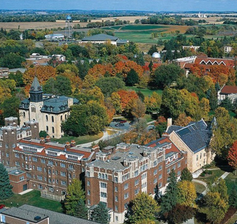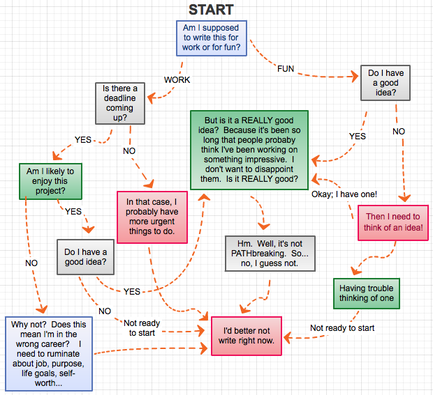|
BW NOTE: This is a guest post by a reader who wanted to remain anonymous. She recently faced the dreaded decision of pissing off a friend or wearing a (ugh!) dress...
A few months ago, my cousin cast me as a bridesmaid in her wedding. Sensing my possible reluctance in the wardrobe department, she immediately informed me that I would be wearing a dress. Period. Because my cousin and I grew up together as friends, I made no verbal protest (BTW: This BW post is a must read for any straight bride with a lesbian (non-femme) bridesmaid). As details of the dress leaked, my dread grew. The bride had selected a purple gown with "challenging" qualities from top to bottom. On the bottom, the bridesmaids would sport a train (i.e. a bunch of fabric dragging behind us). On top, we would endure a strapless bodice with boning. For those unfamiliar with boning, a little history lesson: Boning (in the context of fashion) refers to the straight-jacket-like metal that serves to hold in your fat and position your breasts appropriately yet provocatively. Historically, dress designers used actual whalebone. When the bride began sharing details of the dress, I might have failed to exhibit the requisite level of enthusiasm (one of my flaws is an inability to conceal disdain). When the bride inquired, I politely reminded her of my hatred for dresses, lace, and frilly things. During the early stages of the engagement (a year or so before the wedding), I felt comfortable airing my concerns to the bride. During one conversation, my cousin pointed out that I had worn a dress to her sweet sixteen and to our high school homecoming dance. I had indeed. I went to a very homogeneous high school and dared not defy convention during my tender adolescence. The bride failed to grasp why, 10 years later, I couldn’t again conform for the purposes of her happiness. Because I’m petite and naturally pretty feminine looking (though I definitely err on the masculine side of clothes, hair, and shoes), I think my cousin had trouble understanding why a dress would pose such a serious hardship. Had I presented in a more masculine way, she might have more easily seen how dresses don’t fit with my gender identity. I could have explained, but in the context of her wedding planning, it didn’t seem like the right time to delve into the intersection between my sexual orientation, gender identity, and wardrobe choices. At one point, sensing my lack of enthusiasm for her dress selection, the bride proposed that I just rent a tux with a vest to match the bridesmaids' dresses. Now we were onto something! But before I could enthusiastically assent, she continued, more outlandishly: "While you’re at it, you could stand with the groomsmen, because that wouldn’t look weird." Her final suggestion—that I attend the bachelor party—made her sarcasm impossible to ignore. When I persisted in expressing enthusiasm for her suggestions (minus the strippers—she knows I find female strippers unappealing), she ended the conversation with an abrupt, "You’re wearing the dress and I don’t want to hear another word about it." Even when I stopped complaining to her face, the bride continued to worry about my ability to function as a bridesmaid, inquiring as to who would handle my makeup on the big day. When I responded "me," the bride proved unsatisfied, correctly assuming that I lacked the materials and the will to adequately cake myself. Earrings were also strongly recommended to counter my short (read: dykey) haircut. I borrowed some from a co-worker, and with a running start managed to re-pierce my ear hole in a bathroom stall (only my left one had closed over the years). I tried to respect the "no dress talk" rule, opting instead to write whiny entries in my journal and complain about the cost and fittings to my friends. As the wedding neared, my friends advised me to keep my big mouth shut and let the bride enjoy her big day. On the eve of the wedding, the bride furnished each bridesmaid with a gift and enclosed a note. Most notes recognized the bonds of friendship, and the affection she had in her heart for each of us. My letter simply thanked me for not leaving her side even if it meant, wearing a bridesmaid gown. I felt a huge wave of guilt. The bride had been a good friend to me in other ways, and had welcomed my girlfriend at the wedding. Couldn’t I just have dealt with the fabric monstrosity, the bloody left ear hole, and the caked-on face for her special day? At the wedding, I dealt with my suffering in the form of liquid relief, dancing the night away, and tying my train into a tail with a rubber band (and perhaps slapping my dance partners with it). With the help of only seven vodka-themed libations, I did have a blast. I wore the dress for 10 straight hours (I was given instructions not to change out of it at the reception), and I survived (though the tight bodice did a number on my back). Post-wedding, when I think back to the note, I shudder. I have no idea how I could have handled it better. I wanted to be her bridesmaid, and I certainly didn’t want to ruin her special day. Had Butch Wonders posted this article a bit earlier, I might have sent the bride the link. That way, she’d have known how I felt and had a few creative solutions at her disposal (she was actually on the right track in her sarcasm). Even though my morning routine allows me to ready myself for work in three minutes or less, on my cousin's big day this low-maintenance dyke made for a high-maintenance bridesmaid.
19 Comments
Thanks to everyone who responded to the queer college survey I posted a few days ago. Over 60 schools were represented! Most people who responded are in college now or graduated within the last 5-10 years. Today, I'll share the colleges people said were "awesome" for queers:
I was stoked to see the breadth of colleges that provide super atmospheres for queers these days: public, private, and all over the United States! In one of my next posts, I'll share people's experiences on the other end of the spectrum, and I'll also offer some tips for high schoolers on how to find a gay-friendly college.  Carleton College. Small town in MN. GAY! The Huffington Post recently posted this article about the 25 most LGBTQ-friendly colleges in the United States. While some of these were fairly predictable (UC Berkeley, U Mass Amherst, Portland State), others were a little more surprising to me (Ohio State, U of Utah, UC Riverside). Conspicuously absent were some of the small liberal arts colleges I always assumed were bastions of gay-friendliness, like Smith and Reed, as well as colleges in queer-friendly cities (UC Santa Cruz, Harvard). Interesting, though. I was in college in the late 90s and early 2000s, in a fairly gay-friendly region of the country. I met a lot of out men, but very few out women--maybe because I wasn't plugged into the scene (too busy hanging out with my DXH and quitting the rugby team), or maybe because women tend to come out a little later in life. Even in the relatively accepting space of campus dorm life, coming out would have been tough. There were a few gay-bashing incidents on campus during my undergrad years, and even the faculty members that everyone knew were gay weren't exactly "out"--they just didn't mention their home lives. I get emails from high schoolers sometimes, asking for advice on choosing colleges. I thought it'd be cool to do a survey about readers' college experiences. If you attended (or are in) college, I'd *love* it if you'd fill out this short survey if you went to any college at ALL (even if you didn't graduate). I'll post the results Friday! Thanks for participating! I'll be interested to see the results, and I know that young gay and lesbians kids considering college will really appreciate it.
Coming out as a(n obvious) butch dyke when I was previously known as, and basically looked like, a heterosexual woman, was like my very own social experiment about the effects of sexual orientation and gender presentation.
I've written previously about happy surprises that coming out brought to my life. I've talked less about the unhappy surprises; I'll hit some of those now. Here are some ways my interactions with others changed when I came out:
As I said, I'm only listing the negative or neutral things here, and I'm making a lot of generalizations. So please don't take the list too literally. Still, it was incredibly trippy to feel like I had stayed the same, but all these elements of the social world had suddenly changed around me. Do any of these hit home with you? It's been a full week since I've written a Butch Wonders entry. Often when I have something I have to (or want to) write and I haven't really been doing it, my brain does this (click to see a bigger version): I'm learning to write a little faster and get stuff out there immediately. This is the "prototype early and often" principle (in design thinking parlance), or the "fail, fail again, fail better" principle (in Samuel Beckett / Zadie Smith parlance), or the "brain crack" principle (in Ze Frank parlance).
...Anyone else ever experience anything like the flow chart above? |
|



 RSS Feed
RSS Feed